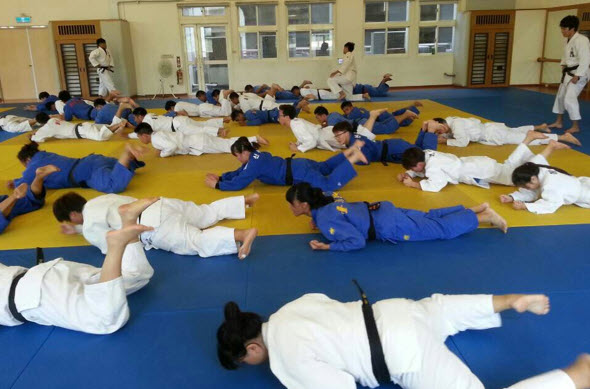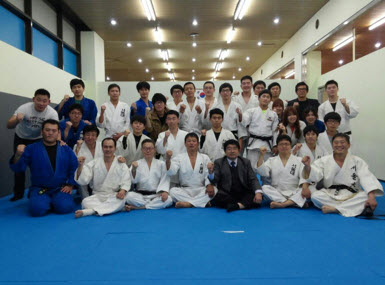
SNU Judo Club students are doing tumbling exercises.
Stepping into the SNU Judo Club training room during practice hours, one will be faced with an intimidating, impressive view: a flurry of men and women in white and blue judogis (judo uniforms), tumbling, grappling, throwing, and being thrown with remarkable grace.
Judo at SNU was initially practiced in separate clubs within their respective colleges. In 1958, these clubs merged into the SNU Judo Club. The club is led by the experienced captain, CHO Seung-woo (College of Engineering), who ensures the smooth and timely running of the judo practices. The club’s vice-captain, PARK Jae-jeon (College of Education), oversees financial operations while the role of training instructor is carried out by judo expert, HUH Sung-yon (College of Engineering). SNU Judo Club is open to all students, both undergraduates and graduates, international and Korean, of all levels of expertise.
Judo literally translates to “Gentle way.” The legendary founder of judo, Kanō Jigorō, named the sport in order to label it as a martial way instead of a martial art. By doing so, he emphasized the philosophy of judo which he believed transcended the sport and applied to life in general.
Seiryoku zen'yō : maximum efficiency, minimum effort
Practice begins with stretching and tumbling exercises. These are not only carried out to avoid injury but also to maximize flexibility and suppleness. Once these conditions are met, one is able to execute moves with refinement, avoiding excessive force and stumbling movements. The club’s strict policy ensures that all students complete this critical warmup before being allowed to partake in the practice. During SNU Judo’s practice of Randori (free practice), mastery of technique to ensure supple moves is emphasized over utilizing clumsy brute force attacks. SNU Judo captain CHO Seung-woo noted, “I feel that the most impressive philosophy of judo is Jū yoku gō o seisu (gentleness controls hardness). The maximization of efficiency calls for the practitioner to observe how his opponent channels his energy. In doing so, the practitioner can utilize not only his own strength, but to also turn his opponent’s own force against him. This is the beauty of judo. It nullifies the importance of physical stature and strength while emphasizing gentleness.”
Jita kyōei : mutual welfare and benefit
SNU Judo Club has many members who are experts. They are always willing to help out newcomers by providing tips and showing demonstrations. Sports clubs in general are thought to hold strict customs regarding seniority but SNU Judo Club emphasizes a liberal atmosphere which strives to ensure that no one gets left behind. International student from Mexico, Nacxitl Calva (College of Engineering) remarked, “The Judo Club is kind and supportive and it really feels like a brotherhood. All the members are willing to help and teach while everyone makes an effort to make the language barrier disappear. I think it is also an excellent way to learn Korean.” Following a longstanding tradition, freshmen are not expected to pay subscription fees and upperclassmen take care of newcomers with an almost parental affection. SNU Judo Club’s training instructor HUH Sung-yon, who has years of experience under his belt, instructs beginners with a patience and gentle politeness that belies his formidable physical stature.

SNU Judo Club is a fine example of a club
following its own philosophy.
SNU Judo Club is a fine example of a club following its own philosophy. If there are those who find the philosophy of judo alluring and would like to master one of the most efficient and practical forms of self-defense that pays tribute to gentleness, they would be well advised to attend practices held on Mondays, Wednesdays and Fridays at five thirty on the third floor of the SNU gymnasium building no. 71.
For more information regarding meetings, feel free to contact the SNU Judo Club Captain CHO Seung-woo (010-2733-7177) or access the Naver Café site: www.cafe.naver.com/snujudo
Written by JUN Taehoon, SNU English Editor, taehoonjun@snu.ac.kr
Reviewed by Eli Park Sorensen, SNU Professor of Liberal Studies, eps7257@snu.ac.kr

